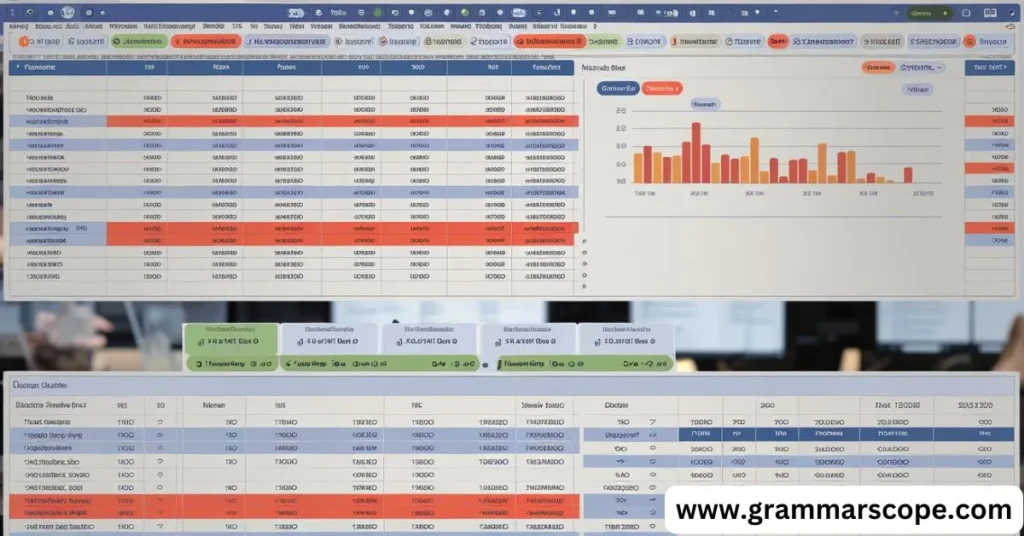Excel or accel? The answer lies not just in the correct spelling but also in understanding their distinct meanings and contexts. Spelling confusion between these two words is more common than you might think.
While they sound similar, their usage varies significantly, and grasping the difference can spell success for clear communication. Imagine sending an email to your boss titled, “Strategies to Accel in Market Expansion,” only to realize later that “excel” was the word you meant. Such a slip could leave an unintended impression, showcasing how vital spelling accuracy is in professional settings.
The allure of language lies in its ability to convey precision. “Accel” and “Excel” both stem from powerful ideas—progress and excellence. But these words operate in very different realms.
Whether you’re aiming to accelerate your pace or excel in your field, knowing when to use each term is key to spelling simplicity and ensuring clarity in your writing. This article dives deep into their definitions, differences, and real-world applications, arming you with the tools to differentiate excel and accel effectively.
What Do They Mean?

Accel
“Accel” is short for “accelerate,” a term that means to increase speed, intensity, or progress. It’s often associated with movement but applies equally to metaphors of growth, development, or quickened effort. For instance, in business, leaders might say, “Let’s accel our product launch timeline.” While this shorthand is informal, it’s growing popular in casual and technical jargon.
In everyday scenarios, “accel” might appear in contexts such as:
- Emails: “To accel our project, we’ve allocated additional resources.”
- Social Media Posts: “Let’s accel this trend! #Innovation”
- Business Reports: “The new strategy aims to accel market penetration by 15%.”
Understanding “accel” helps in framing communication around speed, whether physical or metaphorical. For example, in technical industries like software development, teams often talk about “accelerating sprints” to describe faster cycles of work completion.
Excel
“Excel,” on the other hand, means to perform exceptionally well or surpass expectations in a particular area. It is derived from the Latin word “excellere,” meaning “to rise above.” Beyond its use as a verb, “Excel” is also the name of Microsoft’s flagship spreadsheet program, a tool synonymous with productivity and data management.
You’ll commonly encounter “excel” in scenarios like these:
- Emails: “We expect all team members to excel in their respective roles.”
- Performance Reviews: “Martha excels in client engagement, setting a benchmark for others.”
- Everyday Speech: “If you want to excel at guitar, practice is non-negotiable.”
In short, excelling is about standing out and achieving distinction. Whether it’s in academics, sports, or professional settings, this term embodies the pursuit of greatness.
What’s the Difference?
The primary difference between “accel” and “excel” lies in their meanings and usage. “Accel” relates to speeding up or advancing, while “excel” is all about being outstanding or surpassing expectations. The contrast is evident in their applications:
| Aspect | Accel | Excel |
|---|---|---|
| Meaning | Shortened form of “accelerate” | To perform exceptionally well |
| Usage | Refers to increasing speed or intensity | Indicates outstanding performance |
| Context | Growth, motion, development | Achievement, excellence, distinction |
| Software | Not linked to software | Refers to Microsoft Excel spreadsheet |
For example, you might say, “The company aims to accel its delivery processes,” but “She excels in leadership roles.”
Examples in Context

For “Accel”:
- Email Scenario: “Our team must accel production schedules to meet client demands.”
- Business Meeting: “If we want to accel our market entry, we’ll need additional funding.”
- Daily Life: “The cyclist began to accel, leaving competitors behind in the race.”
- Technology: “Tech startups need to accel innovation cycles to stay relevant.”
- Education: “To accel in learning, students should adopt effective study techniques.”
- Growth Strategies: “To accel our expansion efforts, partnerships with local firms are critical.”
For “Excel”:
- Performance Appraisal: “You consistently excel in teamwork, making you a valuable asset.”
- Academic Achievement: “To excel in calculus, focus on problem-solving techniques.”
- Sports Motivation: “She excelled in the marathon, setting a new personal record.”
- Email Tip: “We believe our team can excel by leveraging new collaboration tools.”
- Creative Arts: “Artists who excel often experiment with various techniques to find their voice.”
- Customer Service: “Businesses that excel in customer support build loyal client bases.”
Synonyms
For “Accel” (Accelerate):
- Speed up
- Quickening
- Hasten
- Expedite
- Advance
- Propel
- Escalate
For “Excel”:
- Surpass
- Outperform
- Shine
- Outshine
- Transcend
- Thrive
- Overachieve
Pro Tips for Mastering the Most Important Paragraph
The “What’s the Difference?” section is crucial because it directly addresses the spelling confusion between “excel” and “accel.” It’s the heart of the article, clearly comparing these terms in a table format. Readers often skim for such summaries, so:
- Keep it concise but rich in detail.
- Use bold text for emphasis on key points like “speed” and “outstanding performance.“
- Ensure examples align with real-world contexts readers can relate to.
- Avoid jargon; clarity is key to spelling simplicity here.
Microsoft Excel: A Special Mention

Microsoft Excel is a household name in productivity tools. This spreadsheet software allows users to organize, analyze, and manipulate data efficiently. Whether you’re calculating financial projections, creating pivot tables, or visualizing trends through charts, Excel in performance remains unmatched.
In professional environments, excelling in using Microsoft Excel can set you apart. For example:
- Financial Analysis: “Jack excels at using Excel for budget forecasting and financial modeling.”
- Project Management: “By leveraging Excel spreadsheets, our team tracks milestones with precision.”
- Data Visualization: “To excel in presentations, Sarah includes Excel-generated charts that simplify complex data.”
Frequently Asked Question
What is the meaning of Accel?
Accel is an informal abbreviation of “accelerate,” meaning to increase speed, intensity, or progress. It is often used in contexts like motion, growth, or quickened effort, either physically or metaphorically.
For example, you might say, “The team decided to accel the development process to meet the tight deadline.” While commonly recognized in informal or technical jargon, “accel” is not typically used in formal writing.
What does it mean to Excel at something?
To excel at something means to perform exceptionally well, surpass expectations, or achieve a level of distinction in a specific area. It involves going beyond the ordinary and demonstrating outstanding skill or achievement. For example, someone might excel in their profession, academics, or a sport, earning recognition for their efforts. This word also emphasizes consistent excellence, as in the sentence, “She excels in leadership, inspiring her team to reach new heights.”
Is it Accel or Excel?
The choice between “Accel” and “Excel” depends entirely on the context of your communication. Use “Accel” when referring to acceleration, speed, or progress, often in informal or technical settings.
Choose “Excel” when describing outstanding performance, success, or proficiency, including its common association with the Microsoft Excel software. By understanding these distinctions, you can ensure clarity and spell accurately every time.
Is it Excel or Excell?
The correct spelling is Excel, meaning to perform exceptionally well or surpass expectations. Excell with a double “l” is incorrect. The word “Excel” is also the name of a widely-used Microsoft spreadsheet software, making its accurate spelling especially important in professional and academic contexts.
Conclusion
Understanding the distinction between “accel” and “excel” is essential for clear and effective communication. Whether you aim to accel in a fast-paced environment or excel by achieving distinction, the correct word choice makes all the difference. Spelling accuracy not only reflects your attention to detail but also enhances your credibility in personal and professional interactions.
Remember, “accel” highlights speed and progress, while “excel” celebrates achievement and excellence. Whether it’s in an email, a report, or daily conversation, mastering these terms ensures you spell accurately and communicate confidently. So, go ahead excel in spelling accuracy while accelerating your linguistic prowess!

Emma Olivia is an experienced blogger and the creative mind behind Grammar Scope. With a passion for language and years of writing expertise, she crafts engaging, informative content that simplifies grammar and writing tips for readers worldwide. Emma’s dedication to clear communication and love for the written word shine through every article she publishes, making Grammar Scope a trusted resource for language enthusiasts and learners alike.






